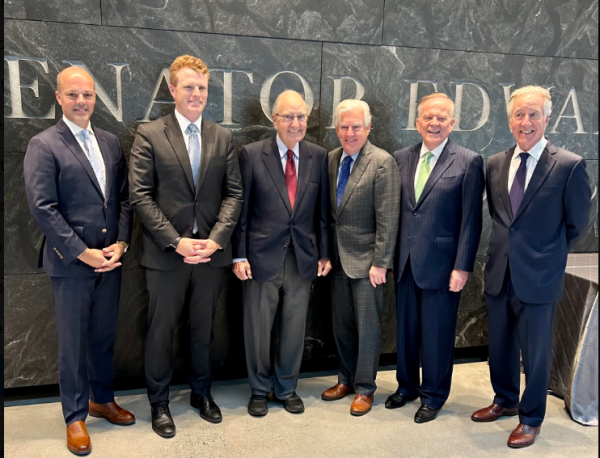September 27, 2023

Senator George Mitchell, the former US Special Envoy for Northern Ireland, addressed an audience that gathered at the Edward M. Kennedy Institute in Dorchester on Tuesday, Sept. 26 to discuss the 25th anniversary of the Good Friday Agreement in Northern Ireland. Shown from l-r are: EMK Institute CEO Adam Hinds, US Special Envoy to Northern Ireland Joe Kennedy III, Sen. Mitchell, UMass President Marty Meehan, New England Council President Jim Brett, and US Rep. Richard Neal. Photo courtesy EMK Institute.
The Edward M. Kennedy (EMK) Institute for the US Senate on Dorchester’s Columbia Point was the setting on Tuesday for a four-hour program that served as a commemorative celebration of the monumental 1998 breakthrough that resulted in relative peace in the North of Ireland and also as a candid discussion of the current political impasse that continues to halt progress and threaten a backslide in the UK-controlled province.
Former US Sen. George Mitchell, the now-elder statesmen and key architect of the Good Friday Agreement, was the honored guest at the event. It was he who shepherded — with the patience of Job— the multi-lateral talks that led to the peace accord that for all purposes ended the sectarian violence that had killed some 3,500 people—and injured another 50,000— in what is euphemistically termed “The Troubles.”
In his remarks, Mitchell was quick to remind the Americans in the room that the frustrating, fractious work of nurturing democracy is a hardship borne not just by the people of Northern Ireland— a not so subtle reminder that our own fragile experiment in self-government has rarely been so taxed by our own domestic dysfunction as it is in the present day.
Tuesday’s gathering showed how well the EMK Institute—when programmed purposefully— can live up to the lofty ambitions of its mission. That was most evident during a panel discussion with leaders from the five main parties in the North of Ireland today, who are struggling to resolve a tense electoral standoff involving their seat of government, Stormont.
Hard-liners on the Unionist side— displeased with the results of elections held last year— have refused to take their seats in the assembly, leaving the rest of the duly elected members unable to meet and, therefore, govern. It has been a frequent and maddeningly-effective tactic employed by the UK-leaning hard-liners to delay the march towards constitutional reforms that one day could lead to a united Ireland. In the 25 years since the US-backed breakthrough, the institutions formed to govern the territory have been fully functioning for only about 60 percent of the time.
On Tuesday, four of the five men representing rival parties implored the fifth— Democratic Unionist David Brooks— to end the boycott, join the assembly, and make his case on the floor of government, rather than from a bullhorn.
The most compelling appeal came from another Unionist, former leader Mike Nesbitt, who urged Brooks to end the obstructionism that he called “an existential threat.” He added, “I really urge David and his colleagues: Let’s get back into Stormont. Let’s show that we can make Northern Ireland work.”
There were hints of common ground. All five men denounced a newly enacted British “Legacy” law that both Catholic and Protestant critics say will make it harder to prosecute those who committed atrocities during the conflict— and harden still-stubborn barriers to reconciliation.
And all agreed that the role of the United States in accompanying Irish and British leaders on their largely-successful journey away from guns and bombs has been a welcome contribution. It’s one that continues through President Biden’s appointment of former US Rep. Joe Kennedy III to serve as a special envoy to the region.
As his uncle may have said of his great-nephew’s task: “The work goes on, the cause endures, the hope still lives, and the dream shall never die.”

